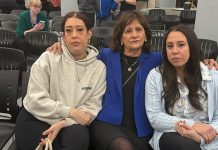
NEW JERSEY – Five doctors wrote prescriptions for opioids without regard for the risks of addiction, overdose and death, the State Attorney General’s Office said.
Dr. Mukaram Gazi of Hamilton, Dr. Serge Menkin of Holmdel, Dr. Kieran Slevin of Hainesport, and Dr. Felix Roque of West New York face having their licenses suspended or revoked. A fifth, Dr. Alexandru Burducea, already had his license revoked.
They are accused of writing “off-label” prescriptions for Subsys, an opioid and cancer pain medication after being paid by the drug’s manufacturer, Insys Therapeutics, Inc. It is described as a fast-acting fentanyl spray 50 times more potent than heroin. The addictive chemical is approved by the Food and Drug Administration (FDA) only for the narrow purpose of treating breakthrough cancer pain in opioid-tolerant patients.
The first four doctors each received more than $50,000 between 2012 and 2016 from Insys, in payments disguised as speaking and consulting fees, officials said. One patient of Roque overdosed, while other patients were at heightened risk of addiction, overdose, and death.
Burducea had his license revoked and was sentenced to nearly five years in prison by a New York federal court for his role in the Subsys kickback scheme.
Charges are merely accusations until proven in a court of law.
“We will hold accountable all those whose misconduct has helped fuel the opioid epidemic in New Jersey,” said Attorney General Gurbir S. Grewal. “Today, we’re taking action against multiple doctors who sold their medical licenses and prescription pads to Insys and put their personal financial interests above their patients’ health and well-being. These actions should serve notice to those who unlawfully push opioids from their exam rooms that they are not above the law and are no different than those that push heroin on street corners.”
“We are committed to holding everyone accountable who is involved in illegal and unethical kickback schemes that have contributed to the overdose epidemic in this state,” said Paul R. Rodríguez, Acting Director of the Division of Consumer Affairs. “We will not allow patients in this state to be used as pawns in moneymaking schemes that pose extreme dangers to patient safety, violate basic principles of medical ethics, and erode trust in the medical profession.”
“These five doctors acknowledged that they had read the risks associated with Subsys and understood that it was approved only for narrow uses as a cancer pain medication,” said Sharon Joyce, Director of NJ CARES. “Nevertheless, they chose to ignore the unequivocal risks to their patients in favor of the easy money Insys was offering. Their unsavory collaboration with Insys endangered their patients and undermined efforts to end the opioid crisis and prevent more lives from being lost.”
The State is seeking to suspend or revoke the doctors’ licenses on grounds of fraud, professional misconduct, gross negligence that endangered the life and safety of their patients, and/or indiscriminate prescribing of a controlled dangerous substance.
According to the allegations:
From 2013 through 2015, Dr. Mukaram Gazi, a urologist, allegedly accepted Insys-funded dinners described as “lectures,” trips for “training,” and payments totaling more than $132,000, which Insys thinly disguised as “speaker’s fees.” In addition to allegations of indiscriminate prescribing for multiple patients, the State’s complaint notes that Gazi’s signature appeared on forms used to obtain insurance coverage for Subsys prescriptions, which incorrectly identified Gazi’s specialty as oncology and provided false explanations for why Subsys was being prescribed.
From 2012 through 2016, Dr. Serge Menkin, a pain management specialist, allegedly accepted $111,000 from Insys, which also paid for travel and expenses for both him and his guests. According to the State, Insys repeatedly paid Menkin thousands of dollars to deliver remarks before audiences that included zero to one prescriber; in at least one instance, Insys paid Menkin in full for an event that was cancelled.
From 2013 through 2016, Dr. Kieran Slevin, an anesthesiologist, allegedly accepted more than $83,000 in cash payments that Insys thinly disguised as “speaker’s fees,” as well as lavish dinners posing as “lectures,” and all-expense paid trips for “training.” According to the State’s complaint, Slevin’s speaker events were held at high-end restaurants chosen by him and were sparsely attended, often by repeat attendees, including those who did not have any prescribing authority.
From 2013 through 2015, Dr. Felix Roque, a pain management specialist, allegedly accepted more than $53,000 in “speaker’s fee” payments from Insys, in addition to meals and travel. As alleged in the complaint, an Insys sales representative advised her superiors that Roque would not prescribe Subsys “until he attended a conference,” and that he had asked “to be put up” at the Fairmont Princess, a luxury hotel in Scottsdale, Arizona. Shortly thereafter, Roque attended a conference in Arizona, funded by Insys and subsequently began prescribing Subsys. As also alleged in the complaint, one of Roque’s patients overdosed on a Subsys prescription he wrote.
Subsys is one of six transmucosal immediate release fentanyl (“TIRF”) medications that instantly deliver the powerful painkiller fentanyl through the oral membranes. Because TIRF medicines carry a high risk for misuse, abuse, addiction, overdose, and serious complications due to medication error, the FDA has subjected these medications to significant restrictions.
The New Jersey medical license of Manhattan anesthesiologist Alexandru Burducea was revoked. He had pleaded guilty in Manhattan federal court last year to accepting $68,000 in bribes and kickbacks from Insys in exchange for prescribing Subsys. In January 2020, he was sentenced to nearly five years in federal prison. During his sentencing, it was revealed that Burducea had also cheated on the examination required for him to be permitted to prescribe Subsys, lied to FBI agents about his involvement in the Insys speaker program, and posted false patient reviews online for two doctors who fired him after he was arrested for his involvement in the scheme.
Other doctors also were banned from practice for indiscriminately prescribing Subsys to non-cancer patients:
Kenneth P. Sun, a Phillipsburg pain management practitioner, had his licensed revoked in August 2018, after he accepted $117,000 from Insys and prescribed Subsys to patients who did not meet the federal criteria for receiving it.
Vivienne Matalon, a Cherry Hill family physician, had her license revoked in May 2018, for indiscriminately prescribing Subsys to three patients who did not meet the federal criteria for receiving it, including one who died from an overdose.
Manoj Patharkar, who owned pain management centers in Middlesex and Passaic counties, had his license revoked in November 2016, for indiscriminately prescribing Subsys, among other misconduct.
Louis Spagnoletti, a Marlton pain management specialist, was temporarily barred from treating patients in March 2018, amid allegations he indiscriminately prescribed opioids including Subsys to seven patients. Spagnoletti died before disciplinary action against was concluded.
Meanwhile, the state is suing Insys’s founder, John N. Kapoor. Insys is a defendant in the State’s lawsuit against Kapoor, but litigation against the company has been on hold since the company declared bankruptcy and filed a plan of liquidation.







